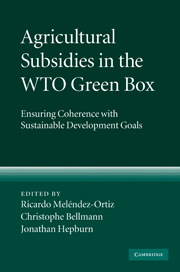Book contents
- Frontmatter
- Contents
- List of contributors
- Preface
- Acknowledgements
- List of abbreviations
- 1 Overview
- PART I The recent evolution of agricultural trade policy reform
- PART II The focus, extent and economic impact of green box subsidies
- PART III Green box subsidies and developing countries
- PART IV Green box subsidies and the environment
- PART V Looking forward: how can change take place?
- Appendix: Text of Annex 2 of the WTO Agreement on Agriculture (“the green box”)
- Index
1 - Overview
Published online by Cambridge University Press: 03 May 2010
- Frontmatter
- Contents
- List of contributors
- Preface
- Acknowledgements
- List of abbreviations
- 1 Overview
- PART I The recent evolution of agricultural trade policy reform
- PART II The focus, extent and economic impact of green box subsidies
- PART III Green box subsidies and developing countries
- PART IV Green box subsidies and the environment
- PART V Looking forward: how can change take place?
- Appendix: Text of Annex 2 of the WTO Agreement on Agriculture (“the green box”)
- Index
Summary
In 1957, at the twelfth session of the GATT Contracting Parties, held at Ministerial level, a Panel of Experts, chaired by Professor Gottfried Haberler, was established to review trends in international trade. The Panel was asked to examine the effect of agricultural protectionism, fluctuating commodity prices and the failure of export earnings to keep pace with import demand in developing countries. The 1958 Haberler Report stressed the importance of minimising the effect of agriculture subsidies on competitiveness, and recommended replacing price support by direct supplementary payments not linked with production, anticipating discussion on green box subsidies.
Three decades later, the simple notion of a shift from price support to producer support was to become the backbone of an ambitious reform of the global agriculture system. As Stancanelli notes, in the 1980s, high administered prices paid to agriculture in industrialised countries led to self-sufficiency and the generation of large surpluses, which were channelled to the world market by means of export subsidies. As a consequence, the fiscal cost of protective measures increased, both through lower receipts from import duties and higher expenditure. This budgetary burden was further compounded by direct subsidies and the cost of storing non-export surpluses.
At the global level, after two successive oil crises in 1973 and 1979, the global economy had entered a cycle of stagnation and recession, combined with mounting foreign debt in the developing world.
- Type
- Chapter
- Information
- Agricultural Subsidies in the WTO Green BoxEnsuring Coherence with Sustainable Development Goals, pp. 1 - 16Publisher: Cambridge University PressPrint publication year: 2009



